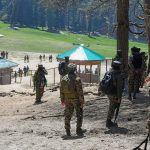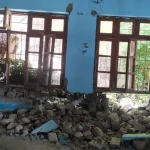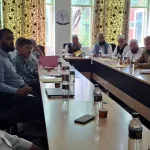Pakistan has got stuck in the quagmire of its own making. Patronisation of terrorism against India in Jammu and Kashmir has affected its credibility. It is an open secret that it has been sponsoring and patronising cross-border terrorism against India. The reason is simple that terrorism is the extended arm of the Pakistani military junta. Pakistan thinks that terrorist organisations operating in Jammu and Kashmir at its behest give it a strategic depth not only in Jammu and Kashmir but allows it to hold the entire South -Asia as hostage. We have seen how it escalated the conflict during the Clinton regime in the United States(US) and then retreated. It has developed a habit of escalating to gain the international attention hoping that it enables it to internationalise the Jammu and Kashmir “issue”. After the neutralisation of Article 370 and 35 A in Jammu and Kashmir the wind was taken out of its sails as this act of New Delhi left Pakistan high and dry. It could not digest that Jammu and Kashmir was re-organised. The series of terrorist attacks in Jammu and now the recent tourist carnage in Pahalgam are the acts meant to activate the sleeper cells to indulge in sabotage. These are acts meant to take out the terrorist cadres out of demoralisation that they have suffered after 2019.There was a lull and it has been broken. Successful Lok Sabha and assembly Election too had unnerved Pakistan. It was looking for an opportunity to activate the secessionist sentiment but so far there has been a muted response as the people in Kashmir organised a complete shut down after the Pahalgam massacre, showing their priorities are development and multiplier effect of the tourism economy.People marched on the streets asking for restoration of normalcy though the tourists were seen packing the bags.Pakistan’s continued tendency to derail peace and normalcy is now an established norm.The mindset of its army and the political class is well known.It thrives on hatred of India.Its Army Chief General Asim Munir announced it clearly that Pakistan’s existence and identity is based on being the anti-thesis of India.This must make it clear that Pakistan is not going to shun its policy of destabilising Jammu and Kashmir.It becomes clear then India will have to frame its Pakistan policy on realism and not on assumptions of peace and brotherhood as this hypotheis have been proved false.To arrive at a comprehensive policy to keep Pakistan on the backfoot it is much needed to keep a close watch on what is happening in Pakistan in terms of its response to Indian moves.Pakistani newspapers and the opinion makers give an insight into its machinations.Former Pakistani Ambassador to the US,UK and UN,Maleeha Lodhi in her article in the Pakistani English daily newspaper,the Dawn has given an insight into the Pakistani policy makers. Her views cannot be brushed aside when it comes to know as to what Pakistan is thinking as she herself was the torch bearer of the Pakistan’s propaganda mill at the international level when it came to indulge in anti-India propaganda.In the beginning she brushes aside the impact of Indian response to the Pahalgam carnage but she gives a peep into the Pakistani establishment with respect to the Indian preparedness to cut Pakistan to size. Being apprehensive about the Indian retaliation to take revenge of the Pahalgam carnage,she writes, “More significantly, Prime Minister Narendra Modi warned of “unimaginable punishment” for the attackers and their backers. This intensified speculation in India that his government was planning some kind of kinetic action to avenge the killings. It recalled memories of the 2019 Balakot crisis when Indian planes crossed the border to launch strikes inside Pakistani territory ostensibly against militant hideouts. ”She did not stop here and further writes, “India’s announcement about putting the IWT “in abeyance” was not made in a vacuum. For the past several years New Delhi has been raising doubts about the fate of the 1960 treaty, that has for over six decades survived wars, confrontations and tensions to provide a framework for water-sharing.” What Pakistan fears after indulging in carnage of innocents in Pahalgam can be gauged from this.She writes, “The imminent danger is from any military action New Delhi is tempted to take, encouraged by what its officials see as ‘effective’ Indian coercive diplomacy in play, which needs reinforcement. Modi’s speech in Bihar on April 24 in which he said terrorists and their backers will be pursued to the “ends of the earth ” is being widely construed as a strong indication of that possibility. Speculation is running rife that conventional kinetic strikes may be combined with cyberattacks and asymmetrical actions by India.”On the hand she fears Indian action with Israeli style retaliation and then brags about the Pakistni response.She reflects Pakistani establishment fears in her words and writes, “Already deployment of heavy weaponry is reported close to the Line of Control and international border. Prime Minister Modi may think he can borrow from the Israeli playbook to ‘punish’ Pakistan but any Indian kinetic action will be met by a strong military response from Pakistan, with uncertain and unpredictable consequences for New Delhi. This will likely set off an escalatory cycle and trigger an all-out crisis, which could be on a larger scale than what happened in 2019.”As is the pattern in Pakistani establishment,it escalates and when its sees its imminent debacle,it seeks for mediators.That is what she exactly predicts and writes, “In 2019, a third party helped to defuse the crisis. Will this happen again? If no such help is forthcoming in a timely way it would make the situation between two nuclear neighbours more dangerous than in the past.” She reflects the thinking of the Pakistani establishment and the military junta that is packed with typical attribute of a irresponsible state.As it wants to enjoy parity with India but at the same time retreats when challenged with full might and hides its true subversive colours and this is well reflected when she gives the expression to the Pakistani establishment’s fissiparous mindset and writes, “The notion of limited war waged under the nuclear threshold is fraught with untold risks. Such a scenario should be avoided at all costs. Even though there is little appetite for this by the Indian side, a backchannel must be re-established without delay to avoid any miscalculation, manage the crisis and prevent it from spinning out of control. The alternative is too terrifying to contemplate.” Pakistan starts a confrontation that wants destabilisation and when exposed asks for the bail out with the creation of the “backchannel”.Maleeha Lodhi,exactly does that by writing , “The notion of limited war waged under the nuclear threshold is fraught with untold risks. Such a scenario should be avoided at all costs. Even though there is little appetite for this by the Indian side, a backchannel must be re-established without delay to avoid any miscalculation, manage the crisis and prevent it from spinning out of control. The alternative is too terrifying to contemplate.” Now India has to frame its policy to expose the duplicity of Pakistan at all fronts. “backchannel” cannot be offered always to Pakistan to “backstab” India all the time after indulging in genocide of the Indian citizens by its terrorists and then indulging in plausible deniability.
Speculations in Pakistan

Sign Up For Daily Newsletter
Be keep up! Get the latest breaking news delivered straight to your inbox.
By signing up, you agree to our Terms of Use and acknowledge the data practices in our Privacy Policy. You may unsubscribe at any time.
Leave a Comment Leave a Comment






